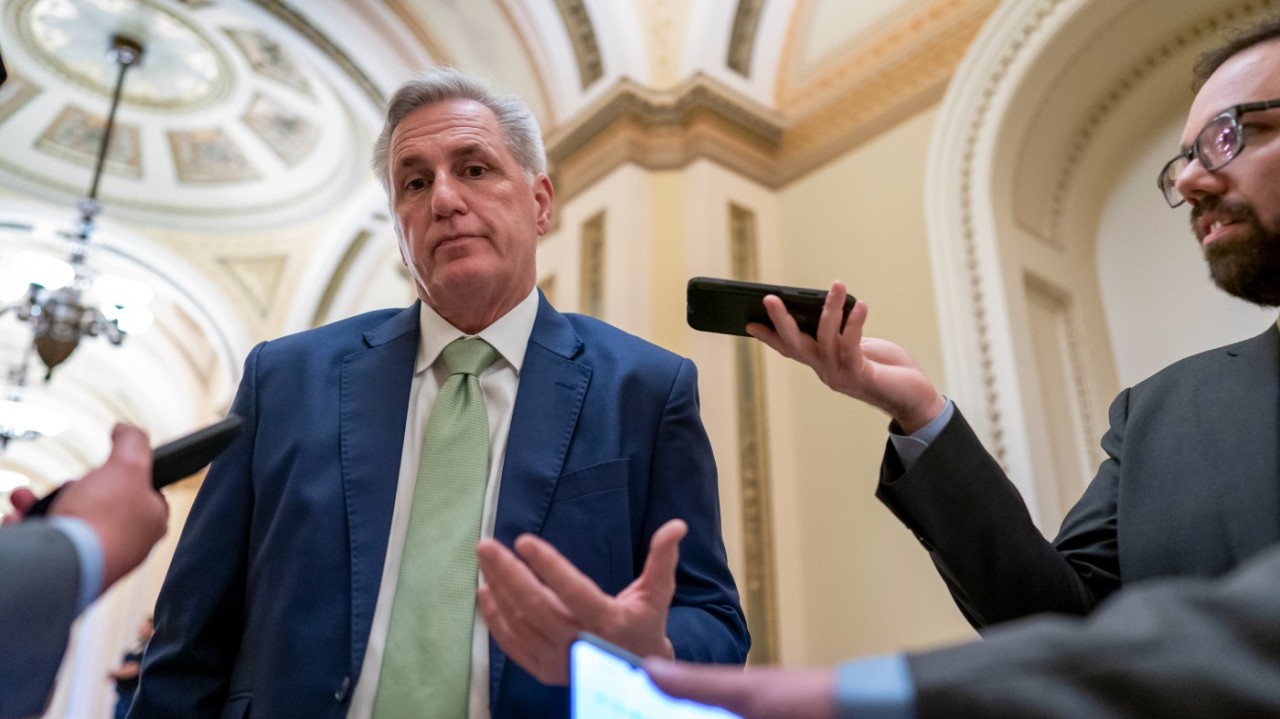Editor’s note: The Hill’s Morning Report is our daily newsletter that dives deep into Washington’s agenda. To subscribe, click here or fill out the box below.
It’s the moment of truth for Republican Leader Kevin McCarthy (Calif.) as the House votes on Tuesday for a Speaker, revealing whether he has the confidence of his conference to lead a new House GOP majority.
It remains unclear how the vote will play out, The Hill’s Emily Brooks reports, as McCarthy faces vocal opposition from a number of hardline Republicans who have threatened to derail his bid. His allies, meanwhile, remain staunchly loyal to the California lawmaker.
If no candidate wins a majority of votes on the first ballot of the Speakership election — which is scheduled for noon — it will mark the first time in exactly 100 years that the House has gone to multiple votes for the post. With 222 Republicans to 212 Democrats in the 118th Congress, McCarthy can afford to lose just four votes. But his rivals have insisted he doesn’t have the votes for weeks, and five House Republicans have strongly indicated they will not vote for the California Republican, while several more have withheld their support.
Rep. Andy Biggs (R-Ariz.), who in December was a challenger to McCarthy for the Speakership nomination, has estimated that around 20 Republicans will not vote for the Republican Leader.
“The problem is that people don’t trust Kevin McCarthy,” Scott Perry (R-Pa.), chairman of the House Freedom Caucus, told The Hill on Sunday. “The fact that we are now approaching the eleventh hour is not the fault, or is not the responsibility, of his detractors. It’s his responsibility, and the blame lies with him.”
Even McCarthy’s Sunday concession to lowering the barriers for rank-and-file members to attempt to depose a sitting Speaker — a change that some GOP lawmakers have warned could weaken their leadership team — might not be enough for him to win the gavel. Right-wing Republicans had been pushing for the rule change, which would allow five members of the House majority to force a vote of no confidence in their leader. But his critics maintain that the measure, which was neutered by Democrats after they took control of the House, should be brought back needing only one member to make the motion as a check on the Speaker’s power, as it did for more than a century (The Hill, The New York Times and Roll Call).
The conservative Club for Growth released a whip notice for the Speakership vote on Monday, urging a no vote on McCarthy without explicitly naming him.
Rep. Kelly Armstrong (R-N.D.), a McCarthy ally, predicted Monday that Republicans will go “however long it takes” to elect a Speaker on Tuesday, but the first vote will likely provide some early indications on how the day will play out (Politico).
“The way the alphabet works, you’ll know on the first ballot pretty quickly,” he said, referring to the alphabetical roll call. “And then we’ll figure out how it grinds out.”
The Hill: What you need to know about the House Speaker election.
A range of GOP stakeholders inside and outside the House could play key roles in the lead-up to and during the vote and its aftermath, writes The Hill’s Jared Gans, who has rounded up the Republicans to watch on Tuesday.
▪ The Hill: Former GOP aide on Speaker vote: “Self-serving” Republicans would make “mockery” of Congress.
▪ The New York Times: Here are the House Republicans to watch if McCarthy’s bid for Speaker falters.
Related Articles
▪ The Washington Post: In her own words: House Speaker Nancy Pelosi (D-Calif.) steps back after decades in charge.
▪ The New York Times: Brazilian authorities will revive a fraud case against Rep.-elect George Santos (R-N.Y.).
▪ The Washington Post: New liberal Latino lawmakers are preparing to challenge the status quo.
▪ Vox: 23 things we think will happen in 2023.
LEADING THE DAY
➤ POLITICS
After a 2022 that saw Democrats celebrate passing key parts of their agenda and defy expectations in the midterms, the next year is set to bring about change in a newly divided Congress and set the table for the presidential election in 2024. The presidential field will take shape as Republicans mull whether to take on former President Trump and President Biden’s own future takes center stage. The Supreme Court, too, could once again reshape the political arena with major rulings.
The Hill’s Brett Samuels details six storylines to watch that will shape the year ahead.
With three Southern states — Louisiana, Mississippi and Kentucky — gearing up for governors’ contests in 2023, their outcomes could give an early indication of the way the political winds are blowing ahead of the presidential election in 2024. As The Hill’s Caroline Vakil reports, While Louisiana Gov. John Bel Edwards (D) is term-limited and unable to run again, Govs. Tate Reeves (R) in Mississippi and Andy Beshear (D) in Kentucky are up for reelection.
The race to become the Republican nominee in the 2024 presidential election is quickly becoming a volatile affair, writes The Hill’s Max Greenwood. While Trump alone has formally launched a campaign, most Republicans expect that to change soon. But questions about the future of the party, and Trump’s own legal troubles, are sure to lead to considerations about whether the former president is still the best standard-bearer for the GOP.
▪ Politico: Here are the four big election storylines for 2023.
▪ NBC News: Here are the four major battles facing Congress in 2023.
The House committee investigating the Jan. 6, 2021, attack on the Capitol on Sunday released a vast database of its underlying evidence, Politico reports. The panel’s evidence provides the clearest glimpse yet at the well-coordinated effort by some Trump allies to help the former president seize a second term he didn’t win.
▪ Vox: Will 2023 be the year Trump is indicted?
▪ The Hill: Trump’s tax returns raise alarms about the fairness of the U.S. tax code.
➤ ADMINISTRATION
While Biden is entering the new year riding high following a better-than-expected Democratic midterm election performance that has improved his political standing while damaging Trump, he also faces lingering questions over his age and his overall political strength. Most notably, The Hill’s Alex Gangitanto reports, questions remain whether he could defeat Florida Gov. Ron DeSantis if he is the GOP nominee in 2024.
Cristina Antelo, a Democratic strategist who runs Ferox Strategies, told The Hill that Biden’s age remains a concern among Democratic voters. Biden, 80, would finish a second term at the age of 86. DeSantis, meanwhile, is 44, while Trump is 76.
“It’s crazy to me that Biden is polling so low, even with Dems, considering how much has been accomplished in these first two years,” Antelo said. “But, yes, Dems seem worried that ‘an old white guy’ at the top of the ticket just isn’t going to cut it if the threats to democracy that Trump embodies aren’t on the ballot.”
▪ Politico: Biden begins 2023 with a stronger hand to play and an inclination to play it.
▪ The New York Times: Biden caps two years of action on the economy, with new challenges ahead.
▪ NPR: Biden has made choosing diverse federal judges a priority.
IN FOCUS/SHARP TAKES
➤ INTERNATIONAL
Russia deployed a series of exploding drones around Kyiv on Monday, marking its most recent attack in a bombardment of strikes taken against Ukraine in the new year. Mayor Vitali Klitschko said in a Telegram post that 40 drones were heading for the city overnight, but air defenses destroyed all of them.
The defenses destroyed 22 drones over the city, three in the region and 15 in other provinces. President Volodymyr Zelensky said in a Saturday address that “no one” will forgive Russia for spreading terror, noting that it attacked Ukraine on New Year’s Eve and other holidays such as Easter and Christmas (The Hill).
Meanwhile, a Ukrainian attack on a building sheltering Russian soldiers in the occupied Donetsk region killed 63 service members on New Year’s Day, the Russian Defense Ministry said on Monday, which would mark one of the deadliest strikes on Russian forces since the beginning of the war. Ukraine claimed that hundreds of soldiers were killed in the attack, but the figure could not be independently confirmed (The Washington Post).
▪ The New York Times: How Russia’s war on Ukraine is worsening global starvation.
▪ The Washington Post: Europe prepares to take in more Ukrainians, with less support, in 2023.
Israel conducted a missile strike on the international airport in Damascus, Syria on Monday, killing two soldiers and injuring two others, according to the Syrian army. The Syrian Observatory for Human Rights, which tracks human rights abuses in the country and has been described as supporting the Syrian opposition to President Bashar Assad, said four people were killed in the strike, but the conflicting reports could not be immediately reconciled (The Hill).
▪ Vox: In China, Xi Jinping has abandoned “zero COVID.” What happens now?
▪ The New York Times: Russia’s war could make it India’s world.
▪ Reuters: North Korean leader Kim Jong Un sacks No. 2 military official.
OPINION
■ A failed Speaker vote for McCarthy would be a historic event, by Brendan Buck, guest essayist, The New York Times. https://nyti.ms/3Z7YgHC
■ Will 2023 be a better year for international peace and public health? by Brahma Chellaney, opinion contributor, The Hill. https://bit.ly/3GACSDM
WHERE AND WHEN
🎆 Happy New Year from us at Morning Report! Alexis Simendinger returns to the newsletter tomorrow, Jan. 4.
👉 The Hill: Share a news query tied to an expert journalist’s insights: The Hill launched something new and (we hope) engaging via text with Editor-in-Chief Bob Cusack. Learn more and sign up HERE.
The House will convene at noon for the Speakership election.
The Senate will convene at 11:30 a.m. for a pro forma session, and reconvene at noon to swear in new members.
The president will receive the President’s Daily Brief at 10:15 a.m.
The vice president will preside over the Senate at noon to open the chamber and administer the oath of office to all newly-elected and re-elected Senators. At 1 p.m., she will ceremonially swear in newly-elected and re-elected Senators in the Old Senate Chamber.
The White House daily press briefing is scheduled at 2:30 p.m.
ELSEWHERE
➤ ECONOMY
International Monetary Fund Managing Director Kristalina Georgieva on Sunday warned that the global economy faces “a tough year, tougher than the year we leave behind.”
“We expect one-third of the world economy to be in recession,” she told CBS’s “Face the Nation.” “Why? Because the three big economies — U.S., EU, China — are all slowing down simultaneously.”
The IMF warned in October about the chance of a global recession in 2023, but different economies may be better positioned to weather it. While Georgieva said the U.S. may avoid a recession this year, the European Union, due to the war in Ukraine and subsequent cost-of-living crisis, may not be able to do so (Bloomberg News).
Big banks, however, are painting a different picture and predicting that an economic downturn is fast approaching. According to The Wall Street Journal, more than two-thirds of the economists at 23 large financial institutions that do business directly with the Federal Reserve are betting there will be a U.S. recession this year, while two others are predicting a recession in 2024.
The Hill’s Sylvan Lane breaks down four ways to prepare for an uncertain 2023 economy: Plan for inflation, don’t expect the stock market to roar back, remember that security will be valuable in a recession, and, finally, brace for higher interest rates.
The Wall Street Journal: Stay for pay? Companies offer big raises to retain workers.
➤ PANDEMIC & HEALTH
The COVID-19 omicron XBB.1.5 variant has nearly doubled in prevalence over the past week and now represents about 41 percent of new cases in the U.S., according to data from the Centers for Disease Control and Prevention (CDC). While data on XBB.1.5 is currently limited, a recent article in the journal Cell by researchers from Columbia University recently found that that sublineages of the BQ and XBB omicron subvariants had a “dramatically increased” ability to evade antibody protection, even among those who had received the bivalent booster dose (The Hill).
The start of the year is a time for many to set workout goals, and motivation for exercise can come in many different forms, The Washington Post reports. Here’s advice from experts on how to make 2023 the year you get moving.
▪ The Atlantic: At-home swabbing still works just fine, but we can’t seem to escape false negatives with rapid tests. What gives?
▪ NBC News: Risk of a dangerous new COVID-19 variant in China is “quite low,” U.S. health expert says.
Information about COVID-19 vaccine and booster shot availability can be found at Vaccines.gov.
Total U.S. coronavirus deaths reported as of this morning, according to Johns Hopkins University (trackers all vary slightly): 1,092,679. Current U.S. COVID-19 deaths are 2,530 for the week, according to the Centers for Disease Control and Prevention. (The CDC shifted its tally of available data from daily to weekly, now reported on Fridays.)
THE CLOSER
And finally … 🧀 Cheese lovers, rejoice. The creamy, nutty, sometimes even pungent dairy product is among the nation’s favorite — and it’s healthier than most would expect.
“Cheese is packed with nutrients like protein, calcium and phosphorus, and can serve a healthy purpose in the diet,” Lisa Young, an adjunct professor of nutrition at New York University, told The Washington Post.
Americans’ per capita cheese consumption is 40 pounds a year, or just over 1.5 ounces a day, but fret not: Research shows that even full-fat cheddar — or brie, or mozzarella — won’t raise or reduce the risk of chronic diseases such as Type 2 diabetes or heart disease. Some studies even show that cheese can be preventative. The process of turning milk into cheese changes the way the nutrients and other components in it are chemically arranged, which alters how it’s digested and processed by the body.
This can lead to health effects that are different from those of eating the same nutrients in another form — say cream or butter.
Stay Engaged
We want to hear from you! Email: Alexis Simendinger and Kristina Karisch. Follow us on Twitter (@asimendinger and @kristinakarisch) and suggest this newsletter to friends!











